List of butterflies of North America (Papilionidae)
Swallowtails are the largest butterflies. They range in size from 2.5–6.4 inches (6.5–16.5 cm). There are about 600 species worldwide with about 31 species in North America. All swallowtails have tails on their hindwings (except the parnassians). Their flight is slow and gliding but, when disturbed, their flight can be quite strong and rapid. They like to feed on various flowers, dung, and urine, and males like to puddle on damp ground. Most male swallowtails locate females by patrolling, and some males perch. The eggs are round and usually laid singly on different kinds of host plants. The larvae have a reddish-orange forked gland, called an osmeterium just behind the head. When frightened, the larva thrusts the gland out releasing a foul odor that will sometimes deter a predator. Many young swallowtail larvae resemble bird droppings. The chrysalis of most species is brown or green and looks like a leaf or branch. It is held upright by a silken loop around the middle called a girdle. The swallowtails overwinter as a chrysalis.
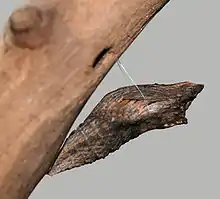
Subfamily Parnassiinae: parnassians
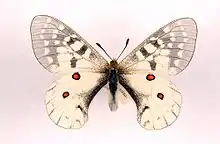
- Eversmann's parnassian, Parnassius eversmanni
- Clodius parnassian, Parnassius clodius
- Phoebus parnassian, Parnassius phoebus
- Phoebus Phoebus parnassian, Parnassius phoebus phoebus
- Rocky Mountain parnassian, Parnassius phoebus smintheus
- Sierra Nevada parnassian, Parnassius phoebus behri
Subfamily Papilioninae: swallowtails
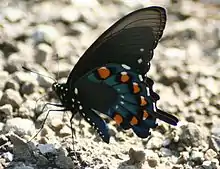
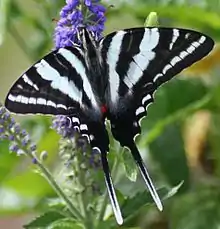
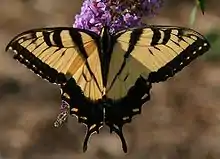
- White-dotted cattleheart, Parides alopius
- Montezuma's cattleheart, Parides montezuma
- Variable cattleheart, Parides erithalion
- Pipevine swallowtail, Battus philenor
- Polydamas swallowtail, Battus polydamas
- Cuban kite swallowtail, Eurytides celadon
- Zebra swallowtail, Eurytides marcellus
- Guatemalan kite-swallowtail, Eurytides epidaus
- Dark kite-swallowtail, Eurytides philolaus
- Red-sided swallowtail, Mimoides phaon
- Queen swallowtail, Papilio androgeus
- Black swallowtail, Papilio polyxenes
- Desert black swallowtail, Papilio polyxenes coloro
- Ozark swallowtail, Papilio joanae
- Short-tailed swallowtail, Papilio brevicauda
- Old World swallowtail, Papilio machaon
- Baird's Old World swallowtail, Papilio machaon bairdii
- Oregon swallowtail, Papilio machaon oregonius
- Anise swallowtail, Papilio zelicaon
- Indra swallowtail, Papilio indra
- Chinese swallowtail, Papilio xuthus
- Band-gapped swallowtail, Papilio torquatus
- Thoas swallowtail, Papilio thoas
- Giant swallowtail, Papilio cresphontes
- Schaus's swallowtail, Papilio aristodemus
- Bahamian swallowtail, Papilio andraemon
- Ornythion swallowtail, Papilio ornythion
- Broad-banded swallowtail, Papilio astyalus
- Eastern tiger swallowtail, Papilio glaucus
- Canadian tiger swallowtail, Papilio canadensis
- Appalachian tiger swallowtail, Papilio appalachiensis
- Western tiger swallowtail, Papilio rutulus
- Two-tailed swallowtail, Papilio multicaudata
- Pale swallowtail, Papilio eurymedon
- Three-tailed swallowtail, Papilio pilummus
- Spicebush swallowtail, Papilio troilus
- Palamedes swallowtail, Papilio palamedes
- Magnificent swallowtail, Papilio garamas
- Pale-spotted swallowtail, Papilio erostratus
- Victorine swallowtail, Papilio victorinus
- Pink-spotted swallowtail, Papilio pharnaces
- Ruby-spotted swallowtail, Papilio anchisiades
References
- Jim P. Brock, Kenn Kaufman (2003). Butterflies of North America. Boston: Houghton Mifflin. ISBN 0-618-15312-8.